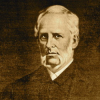Tryon Edwards

Tryon Edwards
Tryon Edwards was an American theologian, best known for compiling A Dictionary of Thoughts, a book of quotations. He published the works of Jonathan Edwardsin 1842. He also compiled and published the sixteen sermons of his great grandfather, Jonathan Edwards, on 1 Corinthians 13, the "Love Chapter", titling the book "Charity And Its Fruits; Christian love as manifested in the heart and life", which was thought by some to be the most thorough analysis of the text of 1 Corinthians...
NationalityAmerican
ProfessionTheologian
CountryUnited States of America
Some men are born old, and some men never seem so. If we keep well and cheerful, we are always young and at last die in youth even when in years would count as old.
Whoever in prayer can say, 'Our Father', acknowledges and should feel the brotherhood of the whole race of mankind.
Mystery is but another name for ignorance; if we were omniscient, all would be perfectly plain!
To rejoice in another's prosperity is to give content to your lot; to mitigate another's grief is to alleviate or dispel your own
Never be so brief as to become obscure.
Anxiety is the poison of human life; the parent of many sins and of more miseries. In a world where everything is doubtful, and where we may be disappointed, and be blessed in disappointment, why this restless stir and commotion of mind? Can it alter the cause, or unravel the mystery of human events?
To be good, we must do good; and by doing good we take a sure means of being good, as the use and exercise of the muscles increase their power.
Most controversies would soon be ended, if those engaged in them would first accurately define their terms, and then adhere to their definitions.
He that never changes his opinions, never corrects his mistakes, will never be wiser on the morrow than he is today.
The great end of education is to discipline rather than to furnish the mind; to train it to the use of its own powers rather than to fill it with the accumulation of others.
Science has sometimes been said to be opposed to faith, and inconsistent with it. But all science, in fact, rests on a basis of faith, for it assumes the permanence and uniformity of natural laws - a thing which can never be demonstrated.
We should be as careful of the books we read, as of the company we keep. The dead very often have more power than the living.
Most of our censure of others is only oblique praise of self, uttered to show the wisdom and superiority of the speaker. It has all the invidiousness of self-praise, and all the ill-desert of falsehood.
Have a time and place for everything, and do everything in its time and place, and you will not only accomplish more, but have far more leisure than those who are always hurrying.